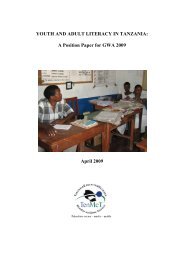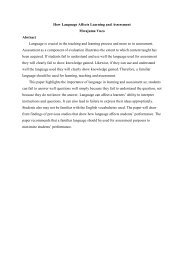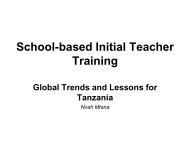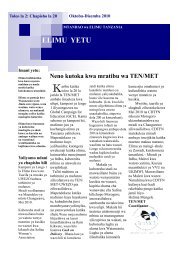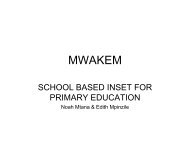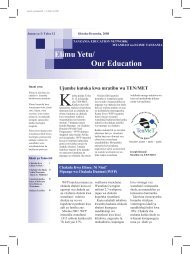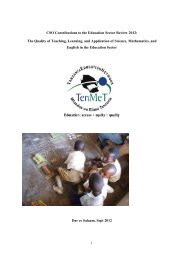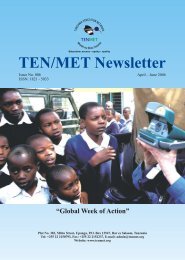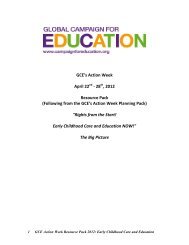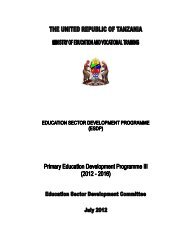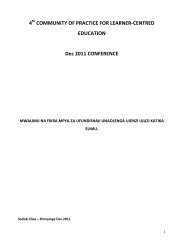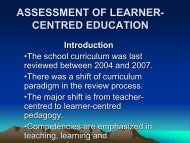TEN/MET - Tanzania Education Network/Mtandao wa Elimu ...
TEN/MET - Tanzania Education Network/Mtandao wa Elimu ...
TEN/MET - Tanzania Education Network/Mtandao wa Elimu ...
Create successful ePaper yourself
Turn your PDF publications into a flip-book with our unique Google optimized e-Paper software.
TAHARIRINa: Joseph Kisanji; Mratibu <strong>wa</strong> <strong>TEN</strong>/<strong>MET</strong>Wapend<strong>wa</strong> <strong>wa</strong>somaji,Napenda kukukaribisheni katika toleo letu la tatu la Jarida la <strong>TEN</strong>/<strong>MET</strong>.Toleo hili lina makala zinazolenga katika kubadilishana uzoefu katika shughuli mbalimbali zinazotekelez<strong>wa</strong> na <strong>wa</strong>nachama<strong>wa</strong> <strong>TEN</strong>/<strong>MET</strong>.Makala hizi zimetokana na ma<strong>wa</strong>silisho yaliyofany<strong>wa</strong> <strong>wa</strong>kati <strong>wa</strong> Tamasha la Jinsia lililoandali<strong>wa</strong> na <strong>Mtandao</strong> <strong>wa</strong> Jinsia<strong>Tanzania</strong> TGNP) ukishirikiana na FemACT tarehe 6-9 Septemba 2005. <strong>TEN</strong>/<strong>MET</strong> ilishiriki kikamilifu katika tamasha hasakatika <strong>wa</strong>rsha iliyohusu ‘Harakati za Wanajamii Katika <strong>Elimu</strong>’. U<strong>wa</strong>silishaji ulilenga makundi ya Wafugaji-Wahamaji namakundi mengine yaliyoach<strong>wa</strong> pembezoni.Shughuli za elimu zinapas<strong>wa</strong> kuendana na mahitaji ya jamii husika. Ni k<strong>wa</strong> misingi hiyo, shirika la Farm Africa linatoamafunzo k<strong>wa</strong> <strong>wa</strong>najamii <strong>wa</strong>lioko Babati katika mbinu bora za ufugaji <strong>wa</strong> kisasa. Mafunzo haya yamewezesha kuinua kipatocha <strong>wa</strong>najamii.Napenda ku<strong>wa</strong>shukuru k<strong>wa</strong> namna ya pekee wote mlioweza kushiriki kikamilifu katika Tamasha la Jinsia k<strong>wa</strong> niaba ya<strong>TEN</strong>/<strong>MET</strong> na kufanya ma<strong>wa</strong>silisho, ambayo baadhi yake yametoka katika toleo hili.Ninapenda tena kukaribisha makala k<strong>wa</strong> ajili ya toleo lijalo. Hii itasaidia katika upashanaji habari na kubadilishana uzoefu.Asanteni na nina<strong>wa</strong>takia usomaji mwema.HARAKATI ZA KIJAMII KATIKA HUDUMA YA ELIMUMIONGONI MWA WAHADZABE NA WABARBAIGNa: Siayi Axwesso Nicodemus –CSY KaratuHarakati za kijamii katika huduma ya <strong>Elimu</strong> zimeku<strong>wa</strong> zikitofautiana toka jamii moja hadi nyingine.Jamii za Wafugaji na Wawindajini kati ya jamii zilizosahaulika miongoni mwetu na kuhitaji uangalizi <strong>wa</strong> pekee katika suala zima la <strong>Elimu</strong>.Wabarbaig na Wahadzabekutoka Hanang na Yaeda Chini, ni miongoni m<strong>wa</strong> kundi hili ambalo linafikiria kidogo sana kuhusiana na mfumo rasmi <strong>wa</strong> elimuambao wote tunaamini ku<strong>wa</strong> ni haki ya msingi ya kila binadamu.Wengi wetu tunaele<strong>wa</strong> umuhimu <strong>wa</strong> elimu na jinsi ambavyo miundombinu ya elimu inaweza kutumi<strong>wa</strong>. Kinyume chake,Wahadzabe na Wabarbaig <strong>wa</strong>naweza kukimbia mbali na miundombinu ya shule iliyo katika maeneo yao. “Watoto wetu <strong>wa</strong>liowengi <strong>wa</strong>liohudhuria elimu katika mfumo rasmi ha<strong>wa</strong>ko katika nafasi ya kuonyesha mabadiliko ama ndani ya familiazao au katika jamii. Hali hii hu<strong>wa</strong> mbaya zaidi uki<strong>wa</strong>elimisha <strong>wa</strong>toto <strong>wa</strong> kike k<strong>wa</strong> ku<strong>wa</strong> mwishoni <strong>wa</strong>tapotezautambulisho <strong>wa</strong>o ambacho ni kitu cha fahari ku<strong>wa</strong> nacho,” anaelezea Bibi mmoja <strong>wa</strong> Kihadzabe.Anaendelea kueleza ku<strong>wa</strong>hakuna mtoto <strong>wa</strong>o hata mmoja aliyehitimu masomo ya chuo kikuu na kujenga <strong>wa</strong>lau hata nyumba kijijini.Jamii ya Wabarbaig ambayo pia ni ya <strong>wa</strong>hamaji <strong>wa</strong>naamini katika mfumo <strong>wa</strong>o <strong>wa</strong> asili <strong>wa</strong> elimu ambao huenez<strong>wa</strong> katika mchakato<strong>wa</strong> makuzi na malezi. <strong>Elimu</strong> hii inaonekana ku<strong>wa</strong> ya manufaa na stahiki zaidi k<strong>wa</strong>o na k<strong>wa</strong> <strong>wa</strong>toto <strong>wa</strong>o k<strong>wa</strong> ku<strong>wa</strong> inagusa ustawi<strong>wa</strong> jamii zao.Wangeweza kuupa mfumo rasmi <strong>wa</strong> elimu kipaumbele endapo ingetole<strong>wa</strong> k<strong>wa</strong> namna ambayo <strong>wa</strong>o <strong>wa</strong>ngependaitolewe.Tafiti zilizofanyika katika vijiji vyaYaeda na Gehandu zimedhihirisha ku<strong>wa</strong> Wabarbaig na Wahadzabe <strong>wa</strong>nao mtindo <strong>wa</strong>o <strong>wa</strong> maishaambao unahitaji kuakisi<strong>wa</strong> katika elimu inayotole<strong>wa</strong> k<strong>wa</strong>o.Tofauti na Wabarbaig,Wahadzabe <strong>wa</strong>ngepenedelea kuhudhuria shulena kujifunza maisha mapya, japo bado <strong>wa</strong>nahisi kuach<strong>wa</strong> na mifumo iliyopo tokea <strong>wa</strong>kati <strong>wa</strong> ukoloni.Kinachoshangaza ni pale ambapo Wabarbaig <strong>wa</strong>naku<strong>wa</strong> tayari kuchangia asali na ng’ombe zenye thamani ya mamilioni ya fedhak<strong>wa</strong> ajili ya sherehe za kijadi kuliko kuchangia shughuli za elimu. Wanahisi kuach<strong>wa</strong> na <strong>wa</strong>tunga sera na k<strong>wa</strong>mba jitihada zaserikali zimeku<strong>wa</strong> hazi<strong>wa</strong>shirikishi sana <strong>wa</strong>o.Kuna haja ya kuelekeza nguvu zaidi na rasilimali nyingine adimu k<strong>wa</strong> makundi yaliyosahaulika kama ya <strong>wa</strong>fugaji <strong>wa</strong>hamaji.Wameku<strong>wa</strong> na hisia za kuach<strong>wa</strong> pembezoni m<strong>wa</strong> mfumo rasmi <strong>wa</strong> elimu kama inavyojidhihirisha katika maisha yao ya kila siku.<strong>Elimu</strong> ni hitaji ya msingi la binadamu ambalo linataki<strong>wa</strong> kuakisi utamaduni <strong>wa</strong> mtu na kutoa njia mbadala katika kumwezeshakukabiliana na maisha katika mazingira yanayomzunguka.UNAPOKUWA MHUDUMU WA MIFUGO YA JAMII (MMIJA)Na: Glory Mziray Farm Africa, Babati.<strong>Elimu</strong> inapas<strong>wa</strong> kuelezea mahitaji ya kijamii na yale ya kiuchumi ya mtu mmoja mmoja na jamii k<strong>wa</strong> ujumla. <strong>Elimu</strong> yakujitegemea ni falsafa iliyotumika ku<strong>wa</strong>andaa <strong>wa</strong>tu kuboresha ustawi <strong>wa</strong>o katika mazingira <strong>wa</strong>liyomo. Kisa hiki cha kutokaBabati ni dhahiri. Mama mmoja kutoka katika jamii ya Wafugaji-Wahamaji ameweza kuboresha maisha ya familia yake baadaya kuwezesh<strong>wa</strong> na shirika la Farm Africa kuhudhuria mafunzo ya msingi ya ufugaji <strong>wa</strong> <strong>wa</strong>nyama.Hadija Hamisi anaishi katika kijiji cha Tsamas.Ameole<strong>wa</strong> na ana <strong>wa</strong>toto tisa. Kijiji cha Tsamas kina <strong>wa</strong>kazi <strong>wa</strong>patao 3,000na kaya 560. Kijiji hiki kipo umbali <strong>wa</strong> kilomita 30 kutoka Babati mjini na idadi ya mifugo zaidi ya 4,500.Ameku<strong>wa</strong> akimudu maisha yake kutokana na shughuli za kilimo na ufugaji <strong>wa</strong> mifugo kama vile ng’ombe, mbuzi, kondoo,punda, kuku, mb<strong>wa</strong> na paka. Familia yake imeku<strong>wa</strong> ikitegemea zaidi mazao ya kilimo cha msimu kama vile mahindi, ndizi,mbogamboga na uuzaji <strong>wa</strong> mifugo kwenye mnada <strong>wa</strong> kila mwezi.Hadija ameku<strong>wa</strong> akitoa huduma ya ushauri k<strong>wa</strong> <strong>wa</strong>fugaji kuhusiana na ufugaji bora k<strong>wa</strong> <strong>wa</strong>najamii wenzake tangualipohitimu mafunzo yake m<strong>wa</strong>ka 2003.Anao uwezo <strong>wa</strong> kutembelea kaya 17 mpaka 20 k<strong>wa</strong> juma. Kipato chake hu<strong>wa</strong> katiya T.Shs 40,000.00 na T.Shs 50,000.00 k<strong>wa</strong> mwezi.Kipato kinachopatikana hutumika kulipia <strong>wa</strong>toto <strong>wa</strong>ke <strong>wa</strong>lioko shule za msingi na sekondari karo ya shule, kukarabatinyumba ya familia, kununulia mifugo kama mbuzi na ngo’mbe, kukidhi mahitaji ya kila siku ya nyumbani yakiwemochakula, mafuta ya taa na mavazi k<strong>wa</strong> ajili ya <strong>wa</strong>toto <strong>wa</strong>ke. “Ninafurahia kupata mafunzo, kuwezesh<strong>wa</strong> vifaa nakusaidi<strong>wa</strong> kuanzisha biashara. Kipato ninachopata kinaniwezesha kumsaidia mume <strong>wa</strong>ngu kuitunza familia yetuna kutoa huduma k<strong>wa</strong> mifugo ikiwemo ya kwetu wenyewe,” anaelezea Hadija. Mradi <strong>wa</strong> Farm Africa umemuwezeshakupata vifaa na mada<strong>wa</strong> yenye thamani ya T.Shs 430,550.00 mnamo Desemba 2004.<strong>TEN</strong>/<strong>MET</strong> YASHIRIKI KATIKA TAMASHA LA JINSIATamasha la Jinsia la m<strong>wa</strong>ka 2005 liliandali<strong>wa</strong> k<strong>wa</strong> ushirikiano baina ya <strong>Mtandao</strong> <strong>wa</strong> Jinsia <strong>Tanzania</strong> (TGNP) naWanaharakati <strong>wa</strong> Masuala ya Jinsia (FemAct).Tamasha hili lilifanyika tarehe 6 – 9 Septemba 2005 katika vi<strong>wa</strong>nja vya<strong>Mtandao</strong> <strong>wa</strong> Jinsia <strong>Tanzania</strong>, eneo la Mabibo jijini Dar es Salaam. Maudhui ya tamasha hili yaliku<strong>wa</strong>: “Jinsia,Demokrasia na Maendeleo: Harakati za Wanajamii Katika Ujenzi <strong>wa</strong> Dunia Mbadala na Bora Zaidi.” Tamasha hilililihusisha <strong>wa</strong>tu binafsi na mashirika katika kupeana uzoefu na maarifa, kujengeana uwezo na kupata mikakatimichache mizuri na inayoweza kutekelezeka baada ya kongamano.Maudhui ya tamasha la m<strong>wa</strong>ka huu yaliakisi Mpango Mkakati <strong>wa</strong> <strong>TEN</strong>/<strong>MET</strong> katika nyanja za Midahalo ya Sera naUtetezi, Ma<strong>wa</strong>siliano na Upashanaji Habari, pamoja na Kujenga Uwezo <strong>wa</strong> Wanachama. Wote tunashawishika ku<strong>wa</strong>chochote tukifanyacho katika udogo au ukub<strong>wa</strong> <strong>wa</strong>ke, k<strong>wa</strong> namna moja au nyingine kina uhusiano katika kuletamabadiliko ya elimu kisera na kiutekelezaji.Baadhi ya <strong>wa</strong>nachama <strong>wa</strong> <strong>TEN</strong>/<strong>MET</strong> <strong>wa</strong>lioshiriki kikamilifu katika masualaya <strong>Elimu</strong> kwenye tamasha hilo ni pamoja na : Haki<strong>Elimu</strong>, Taaluma Women Group, Farm Africa - Babati, ChristianSpiritual Youth Missionary na FAWE (Forum for African Women <strong>Education</strong>alists).Mada ndogondogo zilizojadili<strong>wa</strong> katika vikundi <strong>wa</strong>kati <strong>wa</strong> tamasha ni pamoja na: “Harakati za Wanajamii katikaMichakato ya Kisera Kitaifa na Kimataifa”, pamoja na “Harakati za Wanajamii katika <strong>Elimu</strong>”. Pamoja na ufinyu <strong>wa</strong>muda uliokuwepo, ushiriki <strong>wa</strong> <strong>TEN</strong>/<strong>MET</strong>, ambao ulihusu u<strong>wa</strong>silishaji kutoka k<strong>wa</strong> baadhi ya <strong>wa</strong>nachama, ulifana sana.Washiriki kutoka pande mbalimbali ndani na nje ya nchi <strong>wa</strong>liku<strong>wa</strong> na <strong>wa</strong>kati mzuri <strong>wa</strong> kubadilishana uzoefu namaarifa. Marafiki <strong>wa</strong> <strong>Elimu</strong> <strong>wa</strong> Haki<strong>Elimu</strong> kutoka sehemu mbalimbali ndani ya nchi <strong>wa</strong>li<strong>wa</strong>sisitizia <strong>wa</strong>shiriki wenzaoumuhimu <strong>wa</strong> <strong>wa</strong>najamii kushiriki katika menejimenti za shule. Mahudhurio mazuri shuleni, uandikishaji <strong>wa</strong> <strong>wa</strong>toto,ki<strong>wa</strong>ngo cha kufaulu k<strong>wa</strong> <strong>wa</strong>nafunzi na uhudhuriaji mzuri <strong>wa</strong> <strong>wa</strong>limu darasani umeweza kuongezeka kutokana naushiriki <strong>wa</strong> <strong>wa</strong>najamii katika menejimenti za shule.Katika mada ya Harakati za Wanajamii katika <strong>Elimu</strong>, u<strong>wa</strong>silishaji uliogusa maisha ya <strong>wa</strong>fugaji na <strong>wa</strong>hamaji uliamshausikivu <strong>wa</strong> <strong>wa</strong>shiriki. U<strong>wa</strong>silishaji <strong>wa</strong> aina yake kutoka mkoa <strong>wa</strong> Manyara ulioambatana na ushuhuda na mifano yaWaberbaig na Wahadzahe uliku<strong>wa</strong> ni kielelezo dhahiri kuhusu harakati za kielimu. Jambo lililoibuka katikamajadiliano ni mbinu stahiki zinazoweza kutumika ili kuyaleta makundi ya Wafugaji na Wahamaji hasa Wahadzabe,Wabarbaig na Wamasai katika mfumo rasmi <strong>wa</strong> elimu. Baadhi ya mbinu zilizotole<strong>wa</strong> na <strong>wa</strong>shiriki kama suluhisho niku<strong>wa</strong>shawishi <strong>wa</strong>somi kutoka katika maeneo hayo <strong>wa</strong>baki au <strong>wa</strong>rudi huko ili <strong>wa</strong>we chachu ya mabadiliko. Hiiiliku<strong>wa</strong> mbinu moja mbadala kati ya nyingi zilizolenga kuboresha ki<strong>wa</strong>ngo cha elimu katika makundi ya jamiizilizosahaulika.Kama una ma<strong>wa</strong>zo yoyote ju ya namana ya kuboresha elimu ya <strong>wa</strong>fugaji na <strong>wa</strong>hamaji, tafadhali usisite kutuandikia iliyafahamike na wengine kupitia Jarida hili.Hadija anahitaji kuendeleza ujuzi <strong>wa</strong>ke ili kuboresha huduma anayoitoa. Kupanda k<strong>wa</strong> bei za da<strong>wa</strong> kutazuia wengi kupatahuduma. Upatikanaji <strong>wa</strong> fedha zaidi na milipuko ya magonj<strong>wa</strong> ya mifugo imeku<strong>wa</strong> ni changamoto k<strong>wa</strong> ku<strong>wa</strong> hakunamwitiko <strong>wa</strong> haraka katika upatikanaji <strong>wa</strong> da<strong>wa</strong> na hivyo <strong>wa</strong>teja <strong>wa</strong>ke <strong>wa</strong>napunguza imani katika huduma anayoitoa.MAPITIO YA SEKTA YA ELIMU 2005K<strong>wa</strong> mara ya k<strong>wa</strong>nza Serikali imetekeleza zoezi la Mapitio katika Sekta ya <strong>Elimu</strong>. K<strong>wa</strong> ku<strong>wa</strong> sekta ya <strong>Elimu</strong> katika nchi yetuinashughuliki<strong>wa</strong> na wizara tofauti tofauti zikiwemo Wizara ya <strong>Elimu</strong> na Utamaduni,Wizara ya Sayansi,Teknolojia na <strong>Elimu</strong> ya Juu,Wizara ya Maendeleo ya Jamii, Jinsia na Watoto na Wizara ya Kazi, Maendeleo ya Vijana na Michezo, shughuli zote za mapitiozinaratibi<strong>wa</strong> na Ofisi ya Waziri Mkuu.Tafiti za aina mbalimbali zimefanyika ili kuonesha mafanikio na changamoto katika elimu mpaka sasa. Utafiti ulichanganua Hali ya<strong>Elimu</strong> (Situation Analysis), Mapitio ya Matumizi ya Fedha za Umma katika <strong>Elimu</strong> (PER), Mfumo <strong>wa</strong> Kupima Maendeleo katika<strong>Elimu</strong> (PAF) na Muundo <strong>wa</strong> Kushauriana katika Sekta.Wanachama <strong>wa</strong> <strong>TEN</strong>/<strong>MET</strong> <strong>wa</strong>lishiriki katika tafiti hizi k<strong>wa</strong> kutoa taarifa na/aumaoni kwenye rasimu za ripoti za a<strong>wa</strong>li. Mpaka tulipoku<strong>wa</strong> tukiandaa makala hii, ripoti zote ziliku<strong>wa</strong> zimekamilika isipoku<strong>wa</strong> ileya Mapitio ya Matumizi ya Fedha za Umma katika <strong>Elimu</strong>.Warsha ya Wadau katika Mapitio ya Sekta ya <strong>Elimu</strong> inaandali<strong>wa</strong>. Tarehe zilizopang<strong>wa</strong> kufanyika <strong>wa</strong>rsha hiyo ni kuanzia 30Novemba mpaka 2 Desemba 2005. Imeelez<strong>wa</strong> ku<strong>wa</strong> kutaku<strong>wa</strong> na makundi manne ya majadiliano <strong>wa</strong>kati <strong>wa</strong> <strong>wa</strong>rsha hiyo: (1)Mpango <strong>wa</strong> Maendeleo <strong>wa</strong> Sekta ya <strong>Elimu</strong> kuanzia 2001; (2) Bajeti na Mipango; (3) Ufuatiliaji na Tathmini; na (4) Mdahalo <strong>wa</strong>Kisekta.Mada za makundi haya zitaongoz<strong>wa</strong> na tafiti ambazo ni Hali ya <strong>Elimu</strong>,Matumizi ya Fedha katika Sekta ya <strong>Elimu</strong>,Maendeleoya <strong>Elimu</strong> na Muundo <strong>wa</strong> kushauriana katika Sekta ya <strong>Elimu</strong>. Ili ku<strong>wa</strong> na mijadala yenye kuleta maana zaidi katika <strong>wa</strong>rsha,kunaandali<strong>wa</strong> ziara ya mafunzo k<strong>wa</strong> siku mbili k<strong>wa</strong> ajili ya <strong>wa</strong>na<strong>wa</strong>rsha kwenye taasisi mbalimbali za kielimu wiki mbili hivi kablaya <strong>wa</strong>rsha yenyewe.Asasi za Kijamii zimetenge<strong>wa</strong> nafasi kumi katika <strong>wa</strong>rsha. Bodi ya <strong>TEN</strong>/<strong>MET</strong> ipo katika mchakato <strong>wa</strong> kuainisha <strong>wa</strong>tu<strong>wa</strong>takao<strong>wa</strong>kilisha Asasi za Kijamii. Hivyo ni muhimu kuainisha <strong>wa</strong>tu ambao ni mahiri na wenye sifa na uwezo <strong>wa</strong> kushiriki katikamada za makundi (1-4 yaliyotaj<strong>wa</strong> hapo juu) ili ku<strong>wa</strong> na mchango madhubuti toka k<strong>wa</strong> Asasi za Kijamii.
EDITORIALBy Joseph Kisanji;<strong>TEN</strong>/<strong>MET</strong> CoordinatorDear readers,I would like to invite you to our <strong>TEN</strong>/<strong>MET</strong> Newsletter, Issue No. 3.This issue carries articles aimed at sharing experiences based on activities being implemented by members of <strong>TEN</strong>/<strong>MET</strong>.The articles are based on presentations made during the Gender Festival organized by TGNP in collaboration with FemACT,6 - 9th September 2005. <strong>TEN</strong>/<strong>MET</strong> participated fully in the event, especially in the workshop on “Popular Struggles over<strong>Education</strong>”. The presentations focused on pastoralists, hunter-gatherer and other marginalized communities.<strong>Education</strong>al activities need to be relevant to the needs of the particular community.It is for this reason that Farm Africa is trainingcommunities in Babati in modern animal keeping methods.This training has helped to raise income of community members.I would like to extend my sincere thanks to all who actively participated in the Gender Festival on behalf of <strong>TEN</strong>/<strong>MET</strong> and madepresentations, some of which are reproduced in this issue of our Newsletter.I would like, once again, to invite articles for this Newsletter.As you will appreciate, this serves as a tool for sharing informationand experiences.Thank you and enjoy your reading.POPULAR STRUGGLES OVER EDUCATION AMONGTHE BARBAIG AND HADZABEBy: Siayi Axwesso Nicodemus –CSY KaratuStruggles over education vary from one community to another. Hunter Gatherer communities are among the marginalized socialgroups that need special attention in terms of education. Barbaig and Hadzabe, from Hanang and Yaeda Chini respectively, arewithin such a category that thinks so little on the formal education that we all believe to be a basic human right.Most of us understand the importance of education and how education facilities can be utilized.The Hadzabe and Barbaig incontrast would run a<strong>wa</strong>y from school structures found within their localities. “Most of our children who attended formaleducation have not been in a position of showing changes either within their families or communities.The situation is worse toeducate girls who will finally loose even their identity that is the most prestigious thing we uphold,” narrated an old Hadzabelady. She furthermore explained that none of their children who graduated from the university have built even a house in thevillage.Nomadic Barbaig believe in their traditional <strong>wa</strong>y of education that is transmitted during the socialization process.This kind ofeducation is more appropriate and convenient to them and their children as it reflects their social well-being.They could havegiven formal education a priority if it would be delivered the <strong>wa</strong>y they <strong>wa</strong>nt it to be.Studies in Yaeda and Gehandu villages revealed that Barbaig and Hadzabe have their own life style that need to be reflected inthe kind of education offered to them. Unlike the Barbaig, Hadzabe would prefer attending school and easily adopt new lifestyle.Yet they feel to be ignored by the existing systems since colonial era.Surprisingly,Barbaig are willing to contribute millions worth honey and cattle for their cultural ceremonies rather than educationactivities.They feel that they were ignored by policy makers and government initiatives are more or less of a top down modelrather than being participatory.There is a need of directing more efforts and other scarcely available resources to marginalized communities such as the Hunter-Gatherers.They have a sense of being left aside in the existing formal education system as it is not reflected in their normal life.<strong>Education</strong> is a basic human need that should reflect ones culture and give alternatives to overcome the environment surroundinglivelihood.BECOMING A COMMUNITY BASED ANIMAL HEALTH WORKER (CBAHW)By: Glory Mziray Farm Africa- Babati.<strong>Education</strong> needs to address both socio-economic needs of an individual and the community at large. <strong>Education</strong> forSelf-Reliance is the philosophy adopted to prepare people to improve their well-being in their natural setting.The followingcase study from Babati is illustrative.A woman from a hunter-gatherer community has been able to improve the well-beingof her family after being facilitated to attend a course on basic animal keeping by Farm Africa.Hadija Hamisi is married and a mother of 9 children. She lives at Tsamas village.The village has a population of more than3,000 inhabitants and 560 households.The village is almost 30km a<strong>wa</strong>y from Babati town with more than 4,500 estimatedlivestock.She earns her living through subsistence farming and raising some livestock such as cattle, goats, sheep, donkeys, chicken,dogs and cats respectively. Her family has been depending on seasonal agricultural products such as maize, banana,vegetables and sales of live animals during monthly market.Hadija has been providing advisory services on good husbandry management practices to fellow community memberssince completion of her studies in year 2003. She is capable of visiting 17 to 20 households in a week. Depending on theseason, her monthly income used to range from T.Shs 40,000.00 to T.Shs 50,000.00.The income obtained is used to pay school fees for her children at both primary and secondary school levels,rehabilitationof the family house, purchase of livestock such as goats and cattle, facilitate day to day household needs includingfoodstuffs, kerosene and clothes for her children. “I am very happy that I have been trained, equipped and supportedto start this business.The income realised have helped me to assist my husband in taking care of our children and toprovide services to the livestock keepers including our own animals.” She narrated. Farm Africa project supported herwith materials and drugs worth T.Shs 430,550.00 in December 2004.Her skills need to be developed further so as to improve the quality of service she renders.The tremendous rise in drugprices will hinder majority of the people to get the service.Access to more funds and outbreak of animal diseases has beena challenge due to shortage of drugs. Hadija is likely to lose her clients’ confidence.<strong>TEN</strong>/<strong>MET</strong> PARTICIPATES IN THE GENDER FESTIVAL<strong>Tanzania</strong> Gender <strong>Network</strong> Programme (TGNP) in collaboration with the Feminist Activist Coalition (FemACT)organized year 2005 Gender Festival. The festival <strong>wa</strong>s held 6th – 9th September 2005 at TGNP in Mabibo,Dar es Salaam. The theme of the festival <strong>wa</strong>s “Gender, Democracy and Development: Popular Struggles For AnAlternative and Better World.” It <strong>wa</strong>s an open forum for individuals and organizations to share experience,knowledge, develop capacity and come up with a few, strong and feasible strategies to be implemented after thefestival.The theme of this festival reflected <strong>TEN</strong>/<strong>MET</strong>’s Strategic Plan components that include Policy Debate and Advocacy,Communication and Information Sharing and Capacity Development. We are all convinced that whatever we aredoing regardless of its magnitude has a bearing on education policies and practice either explicitly or implicitly.A number of <strong>TEN</strong>/<strong>MET</strong> members, including Haki<strong>Elimu</strong>,Taaluma Women Group, Farm Africa – Babati, FAWE, ChristianSpiritual Youth Missionary, participated actively in education related issues.Sub-themes discussed during the festival included:“Popular Struggles in Policy Engagement at Global and NationalLevel, and Popular Struggles Over <strong>Education</strong>.” <strong>TEN</strong>/<strong>MET</strong>’s participation, which included only a few presentations dueto limitations of time, <strong>wa</strong>s commendable. Participants had ample time of sharing experience and knowledge fromvarious parts of the country and the world. Haki<strong>Elimu</strong>’s Friends of <strong>Education</strong> from various parts of the countryshared with other participants the importance of community participation in education management at local level.Community participation in school management has led to improvements in school attendance, enrolment,performance and the accountability of teachers.Under Popular Struggles over <strong>Education</strong> sub-theme, the presentation that reflected hunter-gatherer communitiesdrew more attention from participants.A unique presentation from Manyara region with testimonials on the Barbaigand Hadzabe communities <strong>wa</strong>s illustrative. One of the most striking issues <strong>wa</strong>s appropriate techniques to be used inbringing the Hunter-Gatherer communities, especially the Hadzabe, Barbaig and Maasai, into formal educationsystem. Some suggested solutions from participants included retention of educated local people within theirlocalities to act as role models and catalysts of change.For the sake of communication and information sharing; you might have something different that you would like toshare. Please do not hesitate to for<strong>wa</strong>rd your ideas so that they can be shared through this Newsletter.<strong>TEN</strong>/<strong>MET</strong> would like to extend its sincere gratitude to all members who devoted their precious time and othervaluable scarce resources in making Gender Festival 2005 a success.ANNUAL EDUCATION SECTOR REVIEW 2005For the first time the Government is carrying out an <strong>Education</strong> Sector Review this year. As education falls under theportfolio of a number of ministries, namely the Ministry of <strong>Education</strong> and Culture (MoEC), Ministry of Science,Technologyand Higher <strong>Education</strong> (MSTHE), Ministry of Gender, Community Development and Children (MGCDC) and Ministry ofLabour,Youth Development and Sports (MLYDS), the Review is being coordinated by the Prime Minister’s Office (PMO).Four studies have been commissioned to inform the Review.These are the <strong>Education</strong> Sector Situation Analysis (SA), PublicExpenditure Review (PER), Performance Assessment Framework (PAF) and the Sector Dialogue.<strong>TEN</strong>/<strong>MET</strong> members haveparticipated in these studies by providing information and/or commenting on the draft reports. By the time we went tothe printer, all studies except PER had been completed.The <strong>Education</strong> Sector Review Stakeholders’ Workshop is being organised. It is now scheduled to take place from 30November to 2 December 2005. It is envisaged that there will be four discussion groups at the workshop: (1) SectorDevelopment (ESDP since 2001); (2) Sector Planning and Budgeting; (3) Monitoring and Assessment; and (4) SectorDialogue.You will note that these group topics are supported by individual studies, namely Situation Analysis, PER, PAF and<strong>Education</strong> Sector Dialogue. In order to enrich discussions at the workshop, two-day field visits to educational institutionsare being arranged for participants a week or so before the event.Civil society organisations have been allocated 10 places at the workshop. The <strong>TEN</strong>/<strong>MET</strong> Board is in the process ofidentifying people to represent CSOs. It is, therefore, important to identify people who are competent and can speak tothe group themes (1-4 above) with confidence in order to have a strong CSO impact.




